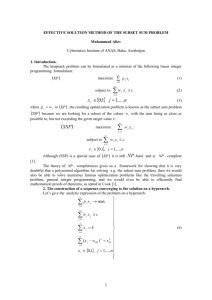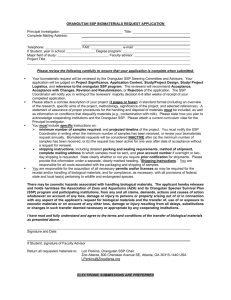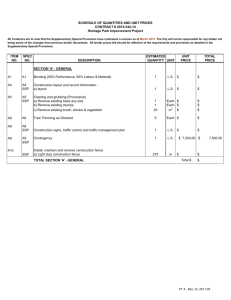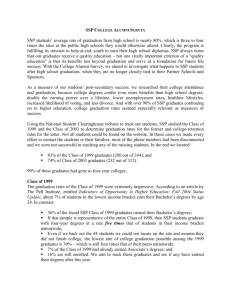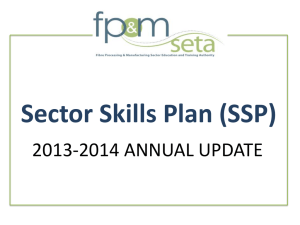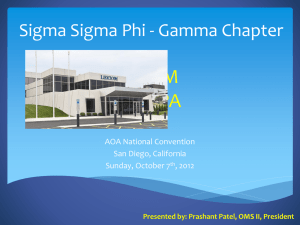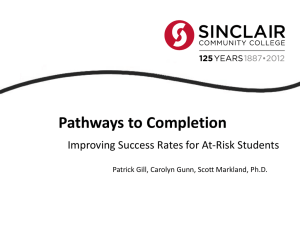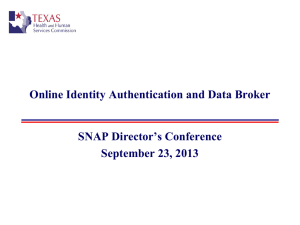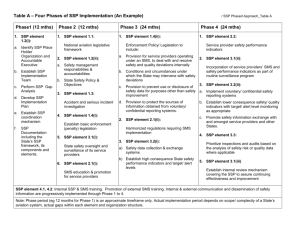PPT - Developed by UNECA
advertisement
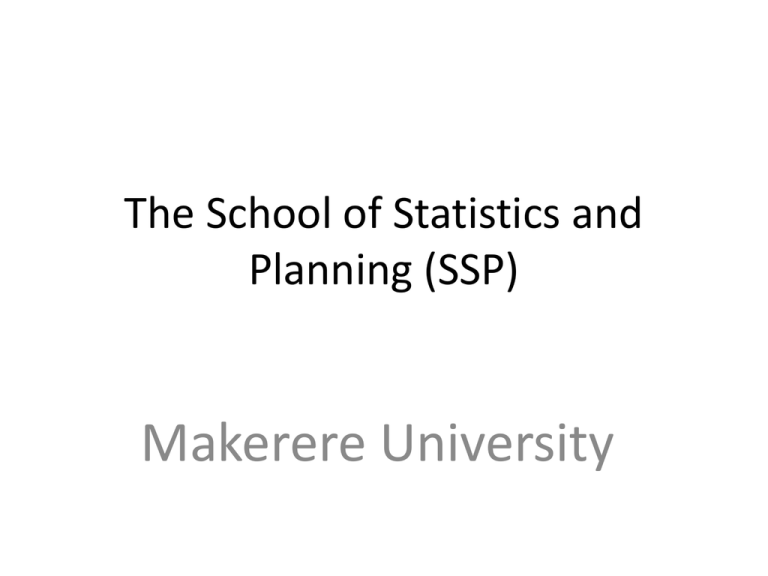
The School of Statistics and Planning (SSP) Makerere University Background • The School of Statistics and Planning (SSP) formerly known as the Institute of Statistics and Applied Economics (ISAE) was established as an autonomous body within the legal framework of Makerere University in July 1969. • The ISAE was expected to provide facilities for the high level professional training in statistics and applied economics to meet the human resource needs of Uganda and other English speaking African countries in the context of the formulation and implementation of national plans for economic and social development. • Under the United Nations Statistical Training Programme for Africa (STPA) 1978-93 and the plan of the Coordinating Committee for Statistical Development (CASD), the ISAE was designated as one of the regional statistical training centres in the African region and was supported to spearhead professional training in official statistics for the English-speaking African countries. Background • When the STPA ceased, the ISAE maintained its regional character and indeed continued to provide training and advisory services to African English-speaking countries. The present core group of countries in this regional cooperation scheme include: Uganda, Botswana, Kenya, Lesotho, Malawi, Swaziland, South Africa, Tanzania, Zambia and Zimbabwe. • This makes the SSP a regional statistical training centre. In addition, the SSP is a mainstream University unit. • Since 1969, the SSP has trained a total of over 5000 statisticians, planners, applied economists and demographers from 21 African countries Departments The SSP has grown both in the scope and depth of its programmes and services and is currently organised into three departments , namely: • Department of Statistical Methods and Actuarial Sciences; • Department of Planning and Applied Statistics; and the • Department of Population Studies. Training programmes The SSP runs five undergraduate and ten postgraduate training programmes. All undergraduate programmes have a duration of three years. The post-graduate diploma programmes are run for one year and the masters degree programmes are run for two years. All Ph.D programmes take at least three and half years and a maximum of five years. Undergraduate programmes 1. 2. 3. 4. 5. Bachelor of Statistics Bachelor of Science in Actuarial Science Bachelor of Science in Quantitative Economics Bachelor of Science in Population Studies Bachelor of Business Statistics Post-graduate programmes 1. 2. 3. 4. 5. 6. 7. 8. 9. 10. Postgraduate Diploma in Demography Postgraduate Diploma in Statistics Master of Statistics Master of Science in Quantitative Economics Master of Arts in Demography Master of Arts in Population and Development Master of Science in Population and Reproduction Health Master of Science in Population Studies Ph.D in Population Studies Ph.D in Statistics Economic Statistics and National Accounts at the undergraduate level At the undergraduate level, all students taking the Bachelor of Statistics degree programme take the following relevant courses: • Time Series and Index Numbers • National Accounts and Income Analysis • Industrial Statistics • Energy Statistics • PPP, External Trade and BoP Statistics • Price Statistics • Distributive Trade and Services Statistics • Financial Statistics Economic Statistics and National Accounts at the postgraduate level At the postgraduate level Economic Statistics and National Accounts is one of the areas of specialisation. Postgraduate diploma students take one course in Economic Statistics and National Accounts. Master of Statistics students take two courses and write a dissertation on a topic in Economic Statistics and National Accounts Short courses and workshops In addition to the above regular programmes, the SSP conducts from time to time short courses and workshops to meet specific skills needs of user countries. Short term Courses in Economic Statistics and National Accounts • From time to time the SSP organizes a Regional Training Workshop Economic statistics and National Accounts. • In 2008 the SSP organized a Sub regional training workshop on the computation and interpretation of PPPs which was attended by participants from 9 countries. • In 2011 the SSP organized a Poverty and Social Statistics workshop which was attended by participants from 8 countries. Challenges • Lack of space • Lack of fellowhips • Lack of training opportunities to potential trainees who lack or fail to meet the minimum entry requirements (standards) • Lack of regular training needs analysis and updates. • Inadequacy of equipment Needs • • • • • • • • Fellowships for trainers and trainees Research funds for trainers and trainees Development of training materials for the short courses Provision of visiting lecturers to offer courses in specialised areas and to fill gaps of traineers who may go for training. Funding for Seminars/ workshops/ short courses in priority areas. Curriculum review Training materials Equipment , Accessories etc. • • • • Computers LCD Projectors Software(including ) (renewal of licenses) if necessay. Text Books/e-books on Economic Statistics and National Accounts (list can be prepared later). Thank you !
